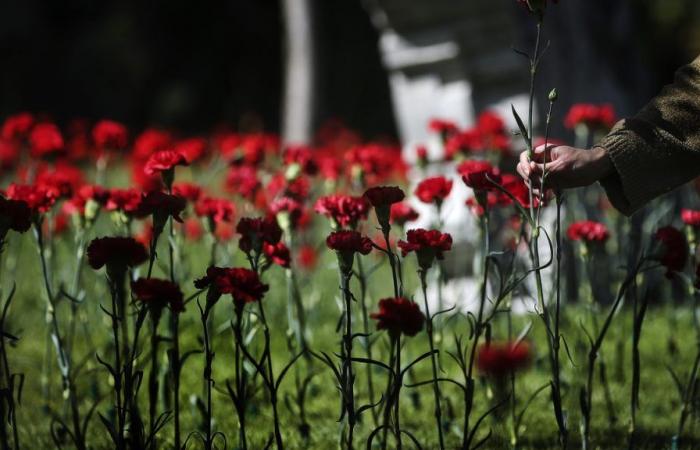“AEven today, deserters are considered traitors to the country. I assume my status as a traitor to the country, a traitor to the country of fascism, hunger, illiteracy, torture, lack of freedom, prison, war, exploitation”, said Fernando Cardoso in a colloquium on the Portuguese colonial war (1961-1974), last week, at Escola Básica e Secundária Dom Martinho Vaz de Castelo Branco, in Vila Franca de Xira.
Carlos Neves recalled that the Government then accused them of being “fearful, cowards and traitors” and that, 50 years after April 25, 1974, this narrative remains valid for some.
“Today this problem is still not resolved. For many conservative people, we continue to be traitors to the country, to their homeland”, he stated. For Carlos, the thousands of young people who said no to the colonial war were a “troop without uniforms and without weapons” whose revolt also helped the revolution.
“If a contingent in Africa was 70,000 to 80,000 soldiers, the 200,000 young deserters, refractory and defaulters arrived to form two more contingents of soldiers for the battlefronts of the colonial war. […] These thousands of young people cannot be discarded, ignored, they have their place in the fight against fascism and colonialism, they contributed to the revolt of career officers, saturated by excessive commissions due to lack of personnel”, reads their testimony published in the book “Exílios 2”, published by the Association of Portuguese Political Exiles.
At the school in Vila Franca de Xira, Carlos and Fernando spent two hours answering questions from students in grades 8 to 11.
They were asked about the lives of young people under the dictatorship, who helped them escape, who welcomed them, how they contacted their families or what marked them in the countries of exile.
In response, they heard reports of censored books and films, young men terrified by the idea of having to go to war, at a time when lovers could not kiss in the street, but also reports of camaraderie and the “extraordinary thing that was the possibility of being free ” in the host countries.
There was also spontaneous applause when asked whether the lack of knowledge about the dictatorship and war contributes to sympathy for the extreme right among young people.
The topic of desertion is still little talked about today. Historian Irene Flunser Pimentel considers it a “controversial and almost taboo issue in Portugal”.
Considering that silencing is oblivion, in 2015, the Association of Portuguese Political Exiles was founded with the aim of recording the memories of deserters (soldiers who abandoned their military units), rebels (they underwent military inspection but fled before incorporation) and exiles colonial war politicians.
Living in the Ajuda neighborhood, in Lisbon, Carlos Neves declared the ‘no to war’ in the Church, among progressive Catholics, and decided to leave the country permanently when he visited a friend injured in Angola, at the Hospital Militar da Estrela.
“What I saw in the hospital – I still get goosebumps – were young people burned, without legs, without arms, and I started thinking with my friends how to solve the problem and the problem was how to get out of the country”, he said.
It was two friends who worked at TAP who suggested he go to the Netherlands. To go by plane (and not ‘jump’) he had to ask for a passport, which led him to go to the PIDE political police headquarters and tell the lie that his family had offered him the trip because he had finished his locksmith mechanic course.
The departure would be in September 1971, but in July his father, a worker at the Port of Lisbon, died. An only child, he still thought about staying so as not to leave his domestic mother, without any means of subsistence and now alone.
She kept the plan because as a widow of a civil servant, the regime found her a job and in any case the mother would be alone: with her son or at war or in exile.
On the plane, he sat next to a Dutch man “whose clothes needed a lot of soap” to whom he told, without knowing who he was talking to, that he was going to Holland to escape the war. It was this naivety that saved him, when at the airport the police didn’t let him pass as they considered the story not credible given that he only had a one-way ticket and 1,200 escudos.
“When the Dutchman realized this, he came from far away shouting to say that he had been in a fascist country for three months, that he spoke to everyone and no police officer ever called him attention and there in the Netherlands, the bastion of democracy, a social country -democrat, lifted restrictions on a young man. He signed a document in which he was responsible for me and gave his home address in Rotterdam”, he recalled.
When they left the airport they never saw each other again. Carlos went to look for him later in Rotterdam. The street didn’t even exist.
Fernando also joined the army, which he joined in the Algarve with a commander who boasted that in Africa he walked around with African skulls on the front of his jeep, before deserting in 1970. He left Portugal ‘by leap’ through the Marvão area, in an escape by car with friends to Paris. However, the ‘no to war’ had been born much earlier.
“From the age of 14 I became aware that, sooner or later, I was going to run into the troops. For all young people, the talk of the day and night was war. This war is not mine, this war is people who are fighting for their freedom and liberation. First, it was the awareness of war and then it was how to make war on war, which implied exile”, he said.
They left Portugal without knowing when they would return and if they would return, admitting that it could be for life.
Carlos, in the Netherlands, and Fernando, in France, stayed with people they got to know until they found accommodation they could afford. They worked in the jobs they gave to illegal immigrants, in cleaning, factories and hotels. Carlos recalled that when cleaning, he would stand still for hours between shifts and, to escape the icy cold of his room, he stayed in the churches, as they were heated.
The social differences that existed in Portugal were also noticeable among exiles, between those whose family means allowed them to study and the majority who worked to survive. “There were two worlds that were not confused in exile, some in the Latin Quarter and others going on strike in the factory where they worked”, reported Fernando Cardoso.
It was amidst the hard life, Carlos and Fernando said, that they discovered freedom, politics, denounced the colonial war, the Portuguese dictatorship, right away in committees of refugees, exiles and emigrants, and from a distance they were enthusiastic about the 25th of April.
Both heard the first news of the coup d’état on the radio and, in different countries and without knowing each other, they were suspicious of the soldiers wearing dark glasses that they later saw on television and who reminded them of the military junta in Latin America, fearing that the revolt would be taken over by the ultra right.
But fears were quickly allayed and Carlos was part of the group of 30 exiles who left Amsterdam in vans for the big May Day demonstration in Paris.
Fernando also participated but, he told Lusa, with a covered face because he still feared the way a military regime would deal with deserters (an amnesty would later be approved for deserters from the colonial war).
Their return to Portugal, with a “suitcase full of dreams and hope”, surprised them. They had left a gray, backward, repressive country and were returning to a party.
“Portugal exploded with affection, creativity, love. I arrived in Lisbon and was amazed, it was a city in effervescence. Paris became an old city. Portugal was a laboratory of creativity for two years”, recalled Fernando.
The colonial war lasted 13 years (1961-1974) and mobilized 800,000 Portuguese soldiers for Africa and 500,000 Africans incorporated into Portuguese troops to fight the liberation movements.
The discussion of desertion was a topic of debate among opponents of the dictatorship from an early age.
The Portuguese Communist Party (PCP) argued that militants should not desert, using their incorporation to enlighten soldiers and organize rejection of war, including on the battlefields.
Progressive Catholics and the so-called extreme left defended the legitimacy of defection, including as a political gesture.
Researchers Miguel Cardina and Susana Martins point to the existence of around 9,000 deserters, a number that they admit has gaps in certain years and military sectors, in addition to between 10,000 and 20,000 refractory and 200,000 young people who failed to pass inspection. Of the young people who were absent, many of them joined family members who emigrated to Europe, escaping poverty.
Read Also: 25 April. Role of theater in the democratic transition will be remembered
Download our free App.
Eighth consecutive year Consumer Choice for Online Press and elected product of the year 2024.
* Study by e Netsonda, Nov. and ten. 2023 product of the year – pt.com
Download our free App.
Eighth consecutive year Consumer Choice for Online Press and elected product of the year 2024.
* Study by e Netsonda, Nov. and ten. 2023 product of the year – pt.com






